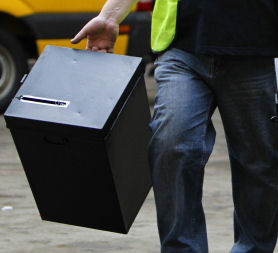Tories lose out on first-past-post majority
Updated on 07 May 2010
The Conservatives fail to secure an overall majority despite gaining a bigger share of the vote than Labour did in 2005.

The Tories polled 36 per cent of the national vote.
Labour have 29 per cent - the party's lowest rating since their humbling defeat in 1983.
Despite talk of "Cleggmania" and their strong showing in the pre-election polls, the Liberal Democrats are trailing in third place with 23 per cent.
The chief executive of the Electoral Reform Society Ken Ritchie criticised the result as being unrepresentative of the people.
"What we have is a lottery where Labour can be only 5 per cent ahead of the Lib Dems but walk away with five times as many seats," he said.
More results day analysis
- Updates throughout the day on our liveblog
- Political Editor Gary Gibbon's blog
The Lib Dems have long campaigned for voting reform. Cleaning up politics, including a "fair" voting system, is one of their four key election priorities.
A Conservative party spokesperson was not able to comment on voting reform in the light of the election results, but said their position was set out in their manifesto.
This says the party supports the first-past-the-post system for Westminster elections "because it gives voters the chance to kick out a government they are fed up with".
The Conservatives pointed out early this morning that Labour had lost more seats than it did in 1979, and the Conservatives gained more than they did in 1979.
To have won an overall majority in terms of parliamentary seats, the Conservatives would have needed their largest swing in voters since World War Two.

Britian now has a hung parliament, with no single party able to win an overall majority of 326 seats.
In the 2005 general election, Labour won a 66-seat majority on just over 35 per cent of the vote.
The Tories polled around 32 per cent, and the Lib Dems 22 per cent.
In 1997's landslide, Labour polled 43 per cent of the vote. The Conservatives got a larger share of the vote than Labour seem set to do this time round - 31 per cent.
The Lib Dems, under Paddy Ashdown, got 17 per cent. In 2001, the third party's share increased to 18 per cent, and in 2005, when Charles Kennedy campaigned against tutition fees and the Iraq war, 22 per cent.
This makes 2010's result the party's highest share of the vote since the merger in 1988, although the Liberal/SDP Alliance also got 23 per cent in 1987, and 25 per cent in 1983.





